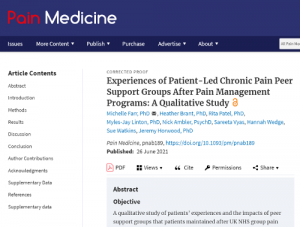Handing over instead of ending pain management programmes: How peer-led meetings build on positive gains
21 July 2021
For people who experience long term pain, continuing peer-led meetings when a pain management course finishes can be an effective low-cost, social intervention, a new article published by NIHR ARC West and North Bristol NHS Trust (NBT) has highlighted. Peer support groups can provide enduring emotional, practical and social benefits, with improved self-management skills, stronger social connections and some reduced use of health services.
Long term pain, which is pain lasting longer than three months, affects four out of 10 people in the UK. It can impact a person’s entire life, including their relationships, sleep, employment and ability to participate in normal day-to-day activities. It often leads to isolation and depression.
The NHS offers group pain management programmes (PMPs) to help people understand and better manage chronic pain. PMPs can help people learn ways of dealing with the disabling effects and distress caused by being in pain. This can help to improve mobility, reduce reliance on prescribed painkillers and gain a sense of control over their pain, helping them to re-establish their family, work and social roles. But the positive impact of these programmes doesn’t always continue after they have ended.
Patients and staff at NBT have worked together to design a way of tackling this by encouraging PMP participants to continue meeting after finishing their professionally led course, to sustain and build on the positive effects in the longer term.
Towards the end of a PMP, a rationale is introduced about maintaining mutual support, with guidance about practicalities and experiences of others who have successfully organised themselves independently of NHS pain services. Follow-on peer support groups are encouraged to continue with goal setting, building on what they achieved during a PMP, and continuing connections with others who know what it is like to live with pain.
NIHR ARC West research has found that these peer support groups encourage people to consolidate self-management techniques into their everyday lives and provide mutual support in the face of pain flare-ups or other setbacks. Through the groups, people helped each other to better self-manage their symptoms in the long term, supporting well-being, reducing feelings of isolation as well as enabling new social life, activities, and friendships.
As well as the peer-reviewed article, practical materials include a video and editable leaflets, developed by people living with pain alongside NIHR ARC West researchers. The materials are designed to support clinicians who run NHS PMPs, to assist patients in setting up their own peer support group after their PMP has ended. The materials include:
- a leaflet for clinicians who run PMPs about how to introduce follow-on groups (PDF)
- a leaflet for patients that can be printed out and given to PMP participants when follow-on groups are being introduced by clinicians (PDF)
- a short film sharing the experiences of people who have attended these groups
We can send editable Word versions of these leaflets to clinicians wishing to support the development of peer support groups after PMPs. Please email Michelle Farr on m.farr@bristol.ac.uk to receive these versions. You will also be sent an evaluation questionnaire that you can use to get a clearer picture of the difference these peer support groups might make to your patients.
Nick Ambler, Clinical Psychologist at NBT, said:
“We have re-written the script for the usual ending of pain management programmes. The professionals who have led the NHS treatment programme step back and those people who want to then take ownership, continuing to meet and support each other, building on what they learned in their pain management course.”
Michelle Farr, Research Fellow at NIHR ARC West, said:
“Our research shows that peer support groups are both low cost and effective, so we hope that other NHS pain services will follow the example set by North Bristol NHS Trust. The research article helps build the evidence base for peer support and we have designed leaflets and a video to help others set them up.”
Watch the video
Paper
